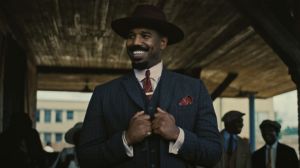Yoel Flohr is Senior Vice President of Franchise Development for AMC, SundanceTV and AMC Studios. He previously founded, had leadership positions in and advised a number companies focused on digital content, fan engagement, gaming and mobile and sent this open letter to ComicBook.com and its readers.
Videos by ComicBook.com
Take a look at the navigation bar for this website and you’ll see a curious thing, an entire tab dedicated to “franchises”, including one I’m responsible for helping to manage, AMC’s The Walking Dead.
There’s a good reason to highlight franchises, even if other media outlets don’t underscore the power and importance of them as clearly as ComicBook.com does. In a crowded and competitive environment, franchises are an increasingly essential goal of anyone in the business of entertaining and engaging with fans. If you don’t have one, you want one. If you have one, you want to make it as big and long-lived as possible, and then you want another.
Maybe we should actually call them “fanchises,” because franchises don’t happen without fans, and the most important and valuable franchises are built around incredibly passionate fans, at scale. It is also worth noting that, unlike the robotic expansion of a fast food chain, entertainment franchises are very much focused on (and made possible by) singular, personal, one-on-one experiences.
I joined AMC Networks in 2016 in the newly-created position of SVP of Franchise Development for AMC, SundanceTV and AMC Studios. My job is to make sure we are doing everything we can to expand and serve the universe of fans around The Walking Dead, Fear the Walking Dead and our other shows with rampant fan bases. By building on the power of the storytelling we put on the screen, we seek to actively engage our vibrant fan communities, listen to them and organically grow them by expanding the palette of ways we connect.
I got my first real taste of these communities of fans when attending San Diego Comic-Con just weeks after joining the network. Seeing the passion and love of fans for our shows, most notably but by no means limited to The Walking Dead and its stellar cast of actors, is really something you have to experience to believe. I have since attended dozens of similar events and still get goose bumps every time any cast, including our (not so little) band of survivors, enters the stage to screams and cheers and then interacts with the people who make their universes possible.
Measuring and assessing the value of franchises goes far beyond the TV-industry standard of Nielsen ratings, which basically reduce passion to ‘eyeballs’ in one demographic category (adults 18-49, women 25-54) or another. Linear TV ratings standardize affinity in a way that does not accurately assess the health and vitality of a franchise in a complete or comprehensive way.
For fans of The Walking Dead and other AMC shows like Into the Badlands, Preacher or even back to Mad Men and Breaking Bad, the experience goes far beyond watching the storytelling unfold on television. These stories and characters become powerful parts of viewers’ lives and, as the network behind them, this dynamic offers us unique opportunities to build new products and services to cater to fandoms that only begin with a television schedule. From the obvious merchandising opportunities like T-shirts, socks (which are a really popular item among fans of The Walking Dead, — who would have guessed?) and dozens of others, we expanded a few years ago into gaming, augmented reality apps, slot machines, collectables, branded wine, events and other new executions that expand the canvas of fandom for millions around the world. And, of course, it’s not just selling fun products to them, it’s giving them more of what they like and have expressed an affinity for on every platform.
All of this changes the way we measure success. So, instead of looking at the ‘eyeballs’ focused on our shows during the short-term linear television window, we look at the notion of ‘fans’ more holistically. We kicked off a significant effort internally to be able to use data and new metrics to better identify, engage, retain and expand fandom around all of our shows, especially those capable of making that rare leap to becoming a franchise. At AMC, we shifted several years ago to something we call a “Live+365” approach to programming, which means we gauge viewer response and interest not in short-term ratings categories, but across a much longer time period. And, at the same time, we support our shows and engage our fans over the course of an entire year, not only when a series is “in-season” with new episodes appearing on the network. This approach is an important part of the way we manage our content, engage with fans and build franchises.
What has been true for all of the above is that acquiring and retaining new viewers and fans is incredibly challenging, especially today, due to the explosion of viewer choice and the commensurate fragmentation that has followed. Yet, one of the things that surprised me most in joining the television industry is that with all of the success networks have had over many decades, their core approach was, almost by definition, less than holistic when it came to building long-term and sustainable ancillary and out-of-season business value. Shows, networks and marketing teams did the very hard work of creating true fans but, for a variety of reasons, relatively few new business opportunities of meaning were ever planned from the start — in the way, for example, we have all heard that animated movies for kids are built from the beginning with this broad engagement in mind. Television is waking up to the reality that many of our biggest fans actually crave and want these 365-day ‘fanchise’ opportunities.
Two recent initiatives I spearheaded along these lines were the creation of The Walking Dead Fan Rewards Club, which allows fans to earn points by expressing their affinity for the series in a variety of ways (consuming content, expressing their interest in the show in social media, purchasing merchandise) that can be converted into merchandise and even once-in-a-lifetime experiences like a personal message from a cast member, a tour of the set where their favorite show is made, or even tickets to a show premiere or Talking Dead. We also launched The Walking Dead Supply Drop, a quarterly subscription box that delivers official merchandise with unique appeal and collectables to fans.
This is the opportunity I saw when joining AMC, and it is an opportunity many are seeing today in and around successful content. Disney does this incredibly well and has for decades – from the show or film to the merchandise to the theme park ride and the game – you get the idea. To be clear, the essence of the value and resonance of any franchise rides on the content itself, and the organic affinity it engenders with passionate fans. This means that, in the management of franchises, everything we do needs to be in the service of the fan and building meaningful relationships with our audiences. We need to ensure that we are never “selling out” and always keeping the integrity of the franchise as our North Star. We actively measure this today and refine these measures, with the fan in mind, as a core operating principle. And, happily, what we often find is that if we think fan-first, they wind up wanting more of what makes their fandom personal and special.
A great element of a relationship with a passionate fan base is that, especially today, it is very much an ongoing conversation, and fans will let you know immediately if you cross a line, or even bump up against one, through social media or other listening tools that are now pervasive and an important health indicator for content companies. In the same way affirmation can go viral, so can a misstep, so a key element of franchise development and management is listening. That’s a great thing, because fans, themselves, are the source of some of our best ideas and we listen as they express new ways they would like to explore their fandom and affinity.
In this so-called era of “Peak TV,” it is harder than ever to break through. And, of course, franchises are so valuable because they typically don’t exist until content has broken through. Success provides an opportunity to build on both sides of the relationship that has never been as powerful and satisfying as it is today. The evolution of television and the technologies around it have created an environment in which franchises have never been more important. At the same time, and because of that environment, those technologies and an emerging focus on building and serving fandoms, it has never been a better time to be a passionate fan.









